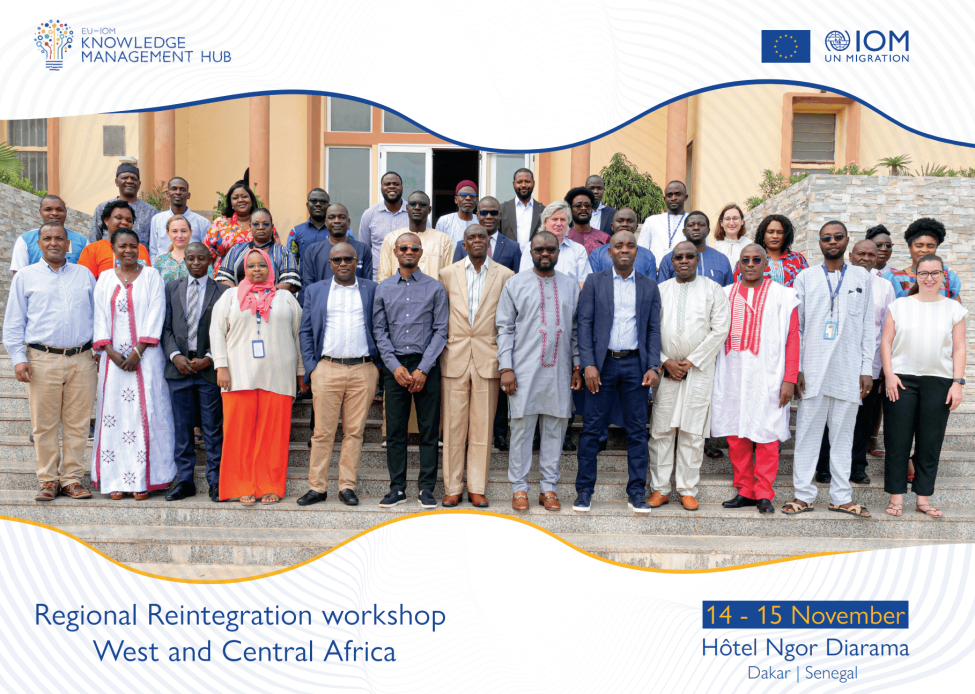-
Who we are
WHO WE AREThe International Organization for Migration (IOM) is part of the United Nations System as the leading inter-governmental organization promoting humane and orderly migration for the benefit of all. IOM has had a presence in West and Central Africa since 1998.
About
About
IOM Global
IOM Global
-
Our Work
Our WorkAs the leading inter-governmental organization promoting humane and orderly migration, IOM plays a key role to support the achievement of the 2030 Agenda through different areas of intervention that connect both humanitarian assistance and sustainable development. Across West and Central Africa, IOM provides a comprehensive response to the humanitarian needs of migrants, internally displaced persons, returnees and host communities.
Cross-cutting (Global)
Cross-cutting (Global)
- Where we work
- Take Action
- Data and Resources
- 2030 Agenda
IOM Holds a Regional Workshop on the Integrated Approach to Reintegration
Dakar – The West and Central Africa Regional office of the International Organization for Migration (IOM) and the EU-IOM Knowledge Management Hub organized a workshop on the integrated approach to reintegration in the West and Central Africa region on November 14-15 with the participation of representatives from governments, employment agencies, and public and private institutions supporting skill acquisition and entrepreneurship from across the region.
The workshop promoted the sharing of experience, good practices, and tools among participants for the implementation of IOM’s integrated approach to reintegration . It also allowed participants to reflect on ways to foster the mainstreaming of reintegration programming into national employment, job creation and microenterprise development. “There is an urgent need to train returnees and build their capacities to enable them to easily access employment.”, said Ms. Aldonga Valencia, Director of Chadians Abroad and Migration. “This workshop is very important as it will allow us to be flexible in our approach to reintegration in our countries. In Chad, for example, we have not yet made much progress in migrant reintegration, and I leave this workshop optimistic about actions to be taken in the future”, she added.
More than 30 participants from 12 countries in the region participated in the workshop, representing actors directly involved in the reintegration of returning migrants. Participants discussed and exchanged experiences on the best ways to integrate returnees in existing employment, job creation and microenterprise development programs, through individual, community, and structural initiatives.
“We discussed the best way to involve local authorities by inviting them to include returnee reintegration in their local development plans and annual investment plans because they should take ownership of this issue”, said Abdoul Karim Hann, Focal Point of the Ministry of Territorial Administration and Decentralization through the National Agency for Emergency and Humanitarian Disaster Management (ANGHUS) in Guinea.
Since the beginning of the EU-IOM Joint Initiative for Migrant Protection and Reintegration in December 2016, close to 87,500 returning migrants have completed the reintegration assistance process in West and Central Africa.
The EU-IOM Joint Initiative applies IOM’s global integrated approach to reintegration anchored on the understanding that achieving sustainable reintegration requires a whole-of-government and whole-of-society approach. Offering platforms for experts to discuss synergies and complementarities between reintegration programming and relevant sectoral programs is essential to expand the services and opportunities available to returnees while promoting national and local ownership.
This workshop is organized through the EU-IOM Knowledge Management Hub, established in 2017 under the Pilot Action on Voluntary Return and Sustainable, Community-Based Reintegration and funded by the European Union. It aims to strengthen learning across return and reintegration programmes and support developing and harmonising approaches, processes, and tools on these topics. As part of this, KMH is rolling out a reintegration training programme, based on the Reintegration Handbook.
For more information please contact: Corantine GROCCIA, Programme Officer (Reintegration) at the IOM Regional Office in Dakar, cgroccia@iom.int


